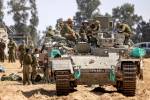Pearl Harbor
Cut off from U.S. sources of steel and oil by embargoes born of outrage over their invasion of China, the Japanese coveted the oil supplies of the British and Dutch South Pacific; we now know they decided in the autumn of 1941 to "use the war fleet, or lose it."
But Washington clearly believed, if war was to come, it would be in the Philippines. Common military doctrine was that the Pacific fleet in Pearl Harbor was safe from aerial torpedo attack. (The Japanese simply attached wooden fins to their torpedoes, preventing them from striking the bottom of the shallow harbor upon release.)
In his new book, "FDR Goes to War," historian Burton Folsom depicts Roosevelt and others in Washington as "white as a sheet" when informed how bad the damage at Pearl Harbor had been. So deeply held was the fantasy of Japanese inferiority that, for a week after the attack, Folsom reports FDR clung to the fantasy that Tokyo must have retained German mercenaries to lead the raid.
Our problems today, a decade after the Sept. 11 attacks, can seem daunting. But they pale in comparison to the dark days of late 1941 and most of 1942, when the news was full of withdrawals and defeats, when America was so unprepared for war the East Coast wasn't even blacked out, allowing U-boat captains to enjoy gleeful target practice on American tankers and merchant ships outlined against the bright lights of the cities and towns of Florida and North Carolina.
Today, while some 10,000 survivors may remain from the 43,000 soldiers, sailors and Marines who were on the island of Oahu on Dec. 7, 1941, they are spread thin across the nation, almost all aged 90 or older. The remaining chapters of the Pearl Harbor Veterans, understandably, now fold their tents in the face of the march of time.
Seventy years have passed. Americans still recall the individual courage of men like Doris "Dorrie" Miller, a mess attendant aboard the battleship West Virginia who dragged his mortally wounded captain to a place of safety, then took over a 50-caliber Browning, firing at Japanese planes till he ran out of ammunition and was ordered to abandon ship.
Miller, lost with the carrier Liscome Bay in 1943, had never been trained to fire a machine gun. He was the first black man to receive the Navy Cross in the conflict.
But there are many kinds of courage, one of which is mere perseverance. In addition to such examples of individual initiative and bravery, we also remember the courage of an entire generation of Americans, on every front, holding onto hope in the nation's darkest hour since Washington's tiny, retreating army shivered on the banks of the Delaware.
From those dark days of 1941, they fought on, and prevailed.























